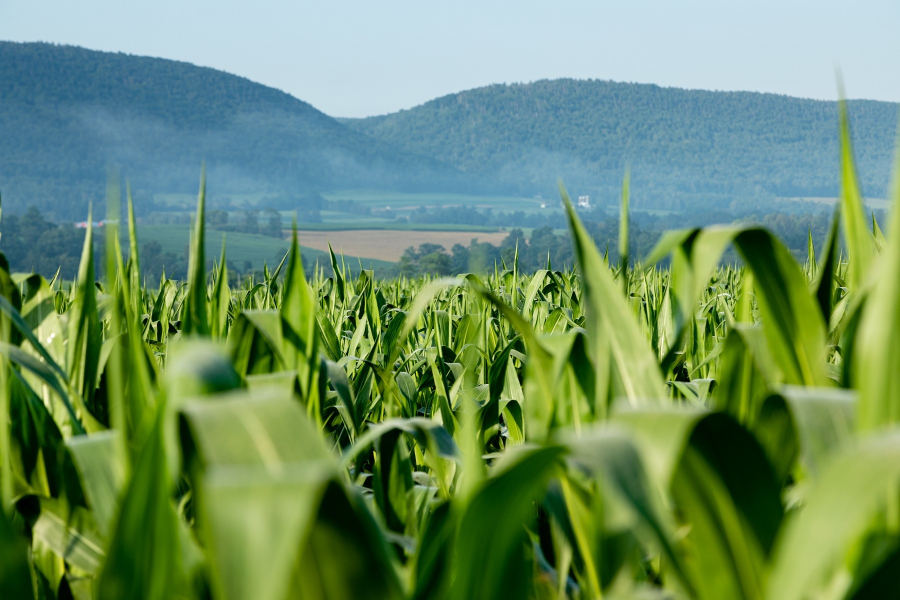Since before the Revolutionary War, agriculture has dominated Pennsylvania’s economy

For as long as Native American tribes were settled in the region, farms have always dotted the landscape of Pennsylvania. The arrival of European settlers only further cemented agriculture as a critical piece of the Commonwealth’s economy. Schrack Farms in Loganton is one of the oldest properties in Pennsylvania, although owner Jim Harbach admits that he doesn’t know what his ancestors grew when it was established nearly three centuries ago before the Revolutionary War. Today, however, the farm is primarily a dairy producer, although they grow forage crops for their cows, such as corn, alfalfa and other small grains.
To give you an idea of how important agriculture is to Pennsylvania, look no further than some of the early Census of Agriculture reports. For instance, in 1900, 224,248 farms were scattered throughout the Commonwealth, making Pennsylvania approximately number 12 in the nation when it came to its number of farms. Like the majority of the country over the last century, Pennsylvania has also seen its farm population fall as residents have slowly migrated into more urban and suburban areas. As of 2017, the Commonwealth was home to only 53,157 farms.
Despite this decrease, a new report from the Pennsylvania Department of Agriculture finds that agriculture has an annual economic impact of $132.5 billion, supports more than 590,000 jobs and is the number three industry in Pennsylvania. Unlike the rest of the country, which saw a two percent decrease in the market value of agricultural goods since the last Census of Agriculture in 2012, the value of Pennsylvania’s farm products actually grew five percent.
A major driver for the creation of this report was to gauge the impact of the 2019 Pennsylvania Farm Bill (Farm Bill) on the agricultural community. The Farm Bill invested more than $24 million in the industry, most notably creating grant programs to provide financial and technical assistance to farmers to help them install and implement best management practices that reduce pollution from their land.
The Farm Bill also provided funding to further grow Pennsylvania’s organic farming industry. Currently, two percent of farms in Pennsylvania are certified organic, but that amount has increased 76% since 2012, from 600 to 1,055 farms. And sales of organic products have grown over 800%, making Pennsylvania the third-highest producer in the country.
The timing for the development of this report—during the COVID-19 pandemic—allowed researchers to include a survey they had conducted that compared farmers’ opinions on the greatest threats and opportunities to their industry both before and during COVID.
Prior to the outbreak of COVID-19 in March 2020, Pennsylvania farms noted that environmental regulations were their third largest concern when it came to agricultural success. However, in a follow-up survey conducted a few months later, farmers noted several strengths that were similarly noted across the country, including the growth of the direct-to-consumer market, fed by the desire for fresh, local food, and the increased willingness of consumers to spend a bit more money on organic products.
Over the long-term, farmers also mentioned that thanks to the Pennsylvania Farm Bill’s increased emphasis on adopting best management practices, as well as those that support climate resiliency, the Commonwealth was positioned for greater success. And with the increased demand for sustainably grown products, Pennsylvania is ahead of the game in their investment in organic farming and other environmentally-friendly farming practices.
On the other hand, farmers are aware of the threats headed their way by a changing climate and development pressures. Heat, extreme weather patterns and higher amounts of polluted stormwater runoff from increasing urban and suburban sprawl continue to disrupt agricultural operations, forcing farmers to factor in additional costs and resources, while their access to clean and safe water continues to be more limited.
There are many ways in which you can help support your local farms—whether you live in Pennsylvania, other parts of the watershed or even across the country. Consider buying local when available, which not only helps the farms in your area, but also cuts down on the additional pollution that occurs when goods are transported over long distances. You can also do your part to help reduce polluted stormwater runoff. Make sure your home’s downspouts point into the grass or gravel, rather than impervious surfaces, and plant more trees and shrubs around your property to help soak up excess runoff. For more ways in which you can help reduce your impact on the lands and waters of the Chesapeake Bay watershed, check out our How-Tos and Tips webpage.

Comments
There are no comments.
Thank you!
Your comment has been received. Before it can be published, the comment will be reviewed by our team to ensure it adheres with our rules of engagement.
Back to recent stories